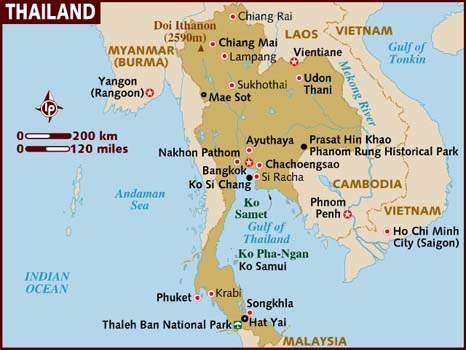Radicals surge in Thai election preparations
March 8, 2019 | Expert Insights
The emergence of the Pandin Dharma Party to contest the March 24 election points to the rise of a fringe of Thai society that is at odds with the royalist-military establishment over religion and expresses growing antipathy to Islam by portraying it as a threat.
Background
Thailand is a country at the center of the Southeast Asian Indo-Chinese peninsula composed of 76 provinces. At 513,120 km2 (198,120 sq mi) and over 68 million people, Thailand is the world's 50th largest country by total area and the 21st-most-populous country. Thailand is a unitary parliamentary constitutional monarchy under a military junta. Thailand is a founding member of the Association of Southeast Asian Nations and remains a major ally of the US. Despite its comparatively sporadic changes in leadership, it is considered a regional power in Southeast Asia and a middle power in global affairs.
General elections are scheduled to be held in Thailand on 24 March 2019. The date was set by the Election Commission on 23 January 2019, only hours after a royal decree was issued authorising the poll. Voting will take place under a military-backed charter, ending one of the longest periods of rule by a military junta in Thailand’s modern history.

Analysis
Buddhism is one of the traditional pillars of Thai society and underpins many aspects of Thai life, but monks have little influence over the state compared to the monarchy and military.
The emergence of the Pandin Dharma Party to contest the March 24 election points to the rise of a fringe of Thai society that is at odds with the royalist-military establishment over religion and expresses growing antipathy to Islam.
Their politics marks a new trend in a traditionally tolerant Thailand, where Buddhist nationalist movements have never taken root in the same way as in countries such as Myanmar and Sri Lanka. The threat to Buddhism, Pandin Dharma’s supporters believe, is from secular authorities whom they accuse of harassing monks and of caring more about Thailand’s tiny Muslim minority than the religion followed by more than 90 percent of Thais. “Monks have been dealt with heavy-handedly by the state,” complains former monk Korn Medee, 47, leader of the party whose name means Land of Buddhist Teaching. “The government has overtly favored the other religion over Buddhism,” he said.
The government’s National Office of Buddhism declined to comment on the allegations or the rise of Buddhist nationalism - saying it was a matter of national security. Two other avowedly Buddhist parties in the election are aligned with the junta, which has imposed measures to bring Thailand’s 40,000 temples under control in the name of tackling scandals ranging from corruption to sex to murder.
Thailand’s longstanding political fracture between the establishment and the populism of former prime minister Thaksin Shinawatra is mirrored in religion.
Thai Buddhism itself is divided into two fraternities: the Mahanikaya of the masses and the more conservative Thammayut, bound to the establishment and more influential since its founding by a 19th-century king. Religion has not been among the top issues ahead of a ballot which is largely shaping up as a contest between parties that support establishment-backed junta leader Prayuth Chan-ocha and allies of Thaksin. But an electoral system designed to help smaller parties - 81 are standing for election - has given greater room for interest groups.
Pandin Dharma accuses the military government of unfairly targeting senior monks - raiding prominent temples such as the giant Dhammakaya complex in Pathum Thani - over alleged scandals. The party wants to formally make Buddhism the state religion and give more support for temples. Although Pandin Dharma strongly rejects accusations of being anti-Muslim, it complains that Muslims get too much state help.
It wants state-sponsored Buddhist settlements in Muslim-majority southern provinces to aid the return of Buddhists who left because of a decades-old insurgency. However, some fear that Buddhist nationalism could also become a threat to centuries-old Muslim communities.
Assessment
Our assessment is that the spread of radical nationalism is making its way to the traditionally tolerant south-east Asian countries as well. We believe that the end of a long military rule is the perfect campaign foundation for right-wing fringe groups to establish a presence in the Thai parliament.
Read More :
Image Courtesy: พีรพัฒน์วิมลรังครัตน์(https://commons.wikimedia.org/wiki/File:Chamber_of_the_National_Assembly_of_Thailand.jpg), „Chamber of the National Assembly of Thailand“, https://creativecommons.org/licenses/by/2.0/legalcode








Comments